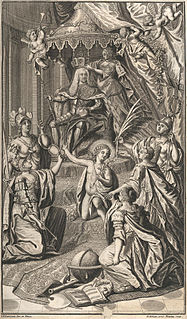This article needs additional citations for verification .(January 2020) (Learn how and when to remove this template message) |


The Imperial election of 1257 was two imperial elections in the Holy Roman Empire held to select the emperor.
This article needs additional citations for verification .(January 2020) (Learn how and when to remove this template message) |


The Imperial election of 1257 was two imperial elections in the Holy Roman Empire held to select the emperor.
The Imperial elections of 1257 took place during a period known as the Great Interregnum of The Holy Roman Empire. In July 1245, Pope Innocent IV declared Frederick II, Holy Roman Emperor deposed, opening a split between the factions Guelphs and Ghibellines. This led to a period of chaos, as various figures tried to become King of the Romans. With the death of Conrad IV in 1254 and his rival claimant William of Holland in 1256, an imperial election became necessary.
The following prince-electors were called:
The two leading candidates were Alfonso X of Castile and Richard of Cornwall. The pope and King Louis IX of France initially favored Alfonso, but they were convinced by the influential relatives of Richard's sister-in-law, the Eleanor of Provence, to support Richard.
With seven electors, it was necessary to gain at least four votes. Richard was backed by three German Electoral Princes (Cologne, Mainz, and the Palatinate), while Saxony, Brandenburg, and Trier supported Alfonso X of Castile.[ citation needed ] Ottokar II of Bohemia at first backed Richard before switching his support to Alfonso, and finally returned to supporting Richard, giving Richard the required simple majority. This led to his election in 1256 as King of Germany. Richard had to bribe four of the electors to secure the election, at an enormous cost of 28,000 marks.[ citation needed ]
Richard of Cornwall was elected but only after a highly partisan election. On May 27, 1257, Konrad von Hochstaden, archbishop of Cologne himself crowned Richard "King of the Romans" in Aachen; [1] Like his lordships in Gascony and Poitou, his title of Germany never held much significance, and he made only four brief visits to Germany between 1257 and 1269.

The prince-electors, or electors for short, were the members of the electoral college that elected the emperor of the Holy Roman Empire.

Adolf was Count of Nassau from about 1276 and elected King of the Romans from 1292 until his deposition by the prince-electors in 1298. He was never crowned by the Pope, which would have secured him the title of Holy Roman Emperor. He was the first physically and mentally healthy ruler of the Holy Roman Empire ever to be deposed without a papal excommunication. Adolf died shortly afterwards in the Battle of Göllheim fighting against his successor Albert of Habsburg.
The imperial election of 1376 was an imperial election held to select the emperor of the Holy Roman Empire. It took place in Frankfurt on June 10.
The imperial election of 1438 was an imperial election held to select the emperor of the Holy Roman Empire. It took place in Frankfurt on March 18.
The imperial election of 1440 was an imperial election held to select the emperor of the Holy Roman Empire. It took place in Frankfurt on February 2.
The imperial election of 1486 was an imperial election held to select the emperor of the Holy Roman Empire. It took place in Frankfurt on February 16.
The imperial election of 1531 was an imperial election held to select the emperor of the Holy Roman Empire. It took place in Cologne on January 5.
The imperial election of 1575 was an imperial election held to select the emperor of the Holy Roman Empire. It took place in Regensburg on October 27.

The imperial election of 1612 was an imperial election held to select the emperor of the Holy Roman Empire. It took place in Frankfurt on June 13.
The imperial election of 1619 was an imperial election held to select the emperor of the Holy Roman Empire. It took place in Frankfurt on August 28.
The imperial election of 1636 was an imperial election held to select the emperor of the Holy Roman Empire. It took place in Regensburg on December 22.
The imperial election of 1653 was an imperial election held to select the emperor of the Holy Roman Empire. It took place in Augsburg on May 31.

The imperial election of 1742 was an imperial election held to select the emperor of the Holy Roman Empire. It took place in Frankfurt on January 24. The result was the election of Charles Albert of Bavaria, the first non-Habsburg emperor in hundreds of years.
The imperial election of 1792 was the final imperial election held to select the emperor of the Holy Roman Empire. It took place in Frankfurt on July 5.

The imperial election of 1273 was an imperial election held to select the emperor of the Holy Roman Empire. It took place in Frankfurt on October 1.
The imperial election of January 13, 1257 was an imperial election to select the emperor of the Holy Roman Empire held by
The imperial election of 1292 was an imperial election held to select the emperor of the Holy Roman Empire. It took place in Frankfurt on May 5. Emperor Rudolf I of Germany had died on 15 July 1291.